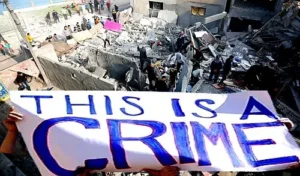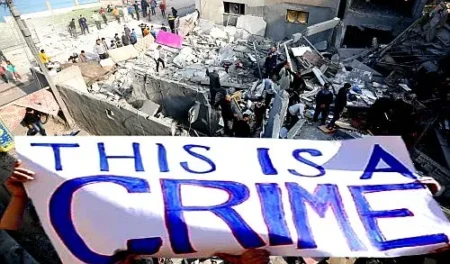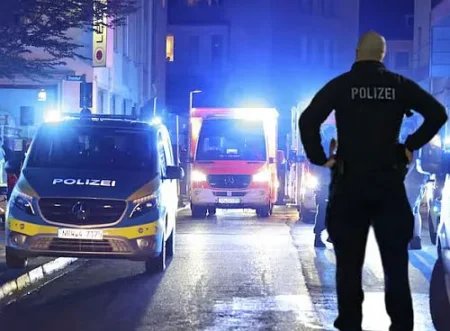Israel-Hamas: Iran retaliation High-wire diplomacy on possible 2024
DUBAI, United Arab Emirates — On Tuesday, the international diplomatic community intensified its efforts in response to Iran’s threat of a retaliatory strike against Israel following the assassination of Hamas official Ismail Haniyeh.
Preventing or limiting an Iranian attack could support ongoing efforts to negotiate a cease-fire in the conflict, which has severely impacted the Gaza Strip and resulted in the deaths of nearly 40,000 Palestinians, as reported by the territory’s health ministry. It could also potentially lead to the release of Israeli hostages held since Hamas’ October 7 assault on southern Israel, which killed 1,200 people and sparked the ongoing conflict.
Gaza Strip
If Iran’s threat is not addressed, it could lead to a coordinated drone and missile assault involving Lebanon’s Hezbollah militia, which is already upset over Israel’s recent killing of one of its senior commanders. This would challenge Israel’s missile defences and its allies, potentially leading to significant damage.
Such widespread losses might compel Israeli Prime Minister Benjamin Netanyahu’s hard-line government to retaliate directly against Iran, risking a broader regional conflict in the Middle East.
This concern has triggered a surge of diplomatic activity in the region. On Monday, France, Germany, and the United Kingdom urged Iran and its allies to “avoid actions that could increase regional tensions and jeopardize the chance for a cease-fire. and the release of hostages.
During a call, British Prime Minister Keir Starmer cautioned Iran’s new reformist President Masoud Pezeshkian about the “serious risk of miscalculation,” urging him to remain calm and deliberate.
Pezeshkian dismissed this advice, stating
A punitive response to an aggressor is a nation’s right and a necessary measure to address crimes and aggression.
He has also confirmed that he will adhere to the directives of Iranian Supreme Leader Ayatollah Ali Khamenei, who has indicated that Israel has “set the stage for severe retaliation with its actions.
Iran has faced ongoing threats from suspected Israeli assassinations and sabotage efforts, intensifying pressure on its leadership to uphold its role within the “Axis of Resistance,” which includes militias it supports in the region.
Egypt and Qatar
At the same time, Iran has struggled with persistent protests, economic difficulties, and other internal challenges that have eroded public support for the government. Its initial sophisticated attack on Israel in April caused minimal damage, potentially necessitating a more significant response this time.
The United States, a key supporter of Israel, has consistently urged Iran to avoid retaliation. It has also supported cease-fire negotiations mediated by Egypt and Qatar to resolve the broader conflict. Meanwhile, the U.S. maintains its military readiness in the Middle East to address potential escalation.
The U.S. military has directed the USS Abraham Lincoln aircraft carrier strike group to expedite its regional deployment. The USS Georgia guided missile submarine has been dispatched to the Middle East, and the USS Theodore Roosevelt aircraft carrier strike group is stationed in the Gulf of Oman.
The deployment also includes extra F-22 fighter jets arriving in the area, and the USS Wasp, an amphibious assault ship equipped with F-35 fighter jets, is positioned in the Mediterranean Sea.
In recent weeks, Western powers are not the only ones engaged in diplomatic efforts. Russian officials under President Vladimir Putin have also actively discussed with Iran. Sergei Shoigu, the secretary of Russia’s National Security Council, visited Tehran and labelled the assassination of Haniyeh as “tragic” and an issue that could not be overlooked in discussions with the Iranian government.
According to the state-run Tass news agency, Russian Deputy Foreign Minister Mikhail Bogdanov emphasized Moscow’s stance, urging all parties to avoid escalating the situation and preventing it from becoming a broader disaster for the region.
Bogdanov emphasized the importance of seeking “political solutions to the current issues,” according to the agency’s report.
For Iran, Russia is one of the few international sources of advanced weaponry willing to engage in trade despite Iran’s nuclear program progressing toward weapons-grade uranium enrichment. Over the years, Iran has sought Sukhoi Su-35 fighter jets and the S-400 surface-to-air missile defense system from Russia. The S-400 could serve as a countermeasure against the American-made F-35 fighter jets. and Israel used.
Iran isn’t the only country in need of advanced weaponry. President Putin has increasingly depended on Iranian-made drones in his conflict with Ukraine. Recently, the situation intensified as Kyiv advanced into Russia’s Kursk region to apply pressure on Moscow while Russia made progress in the Donbas region of eastern Ukraine.
Moreover, President Putin received Palestinian Authority President Mahmoud Abbas in Moscow on Tuesday.
For its part, China has been working to expand its influence in the Middle East with a less overt military presence than the United States. Last year, China played a role in facilitating a détente between Iran and Saudi Arabia, although Riyadh remains cautious of Tehran.
In July, China also facilitated the signing of an agreement between Hamas and Fatah, the dominant faction within the U.S.-backed Palestinian Authority, which governs parts of the occupied West Bank. The deal aims to establish a joint government, but past agreements between these rival factions have failed, raising doubts about the effectiveness of this new accord.
China has also begun to criticize Israel more explicitly amid the conflict, departing from its usual stance of urging restraint on all sides.
Chinese Foreign Ministry spokesperson Lin Jian expressed grave concern over Israel’s military actions, which have resulted in significant civilian casualties in Gaza. We condemn any actions that harm civilians, oppose violations of international humanitarian law, and urge Israel to respond to the international community’s call for an immediate end to the hostilities,” Lin stated. stated on Monday.










